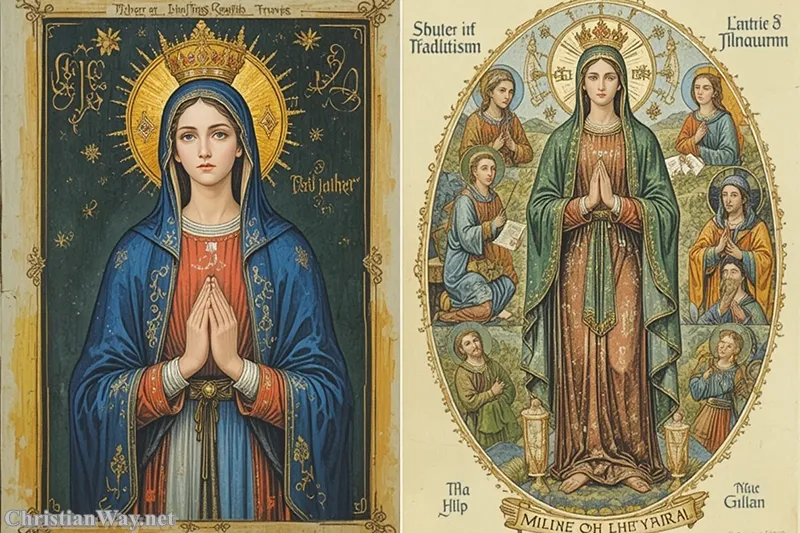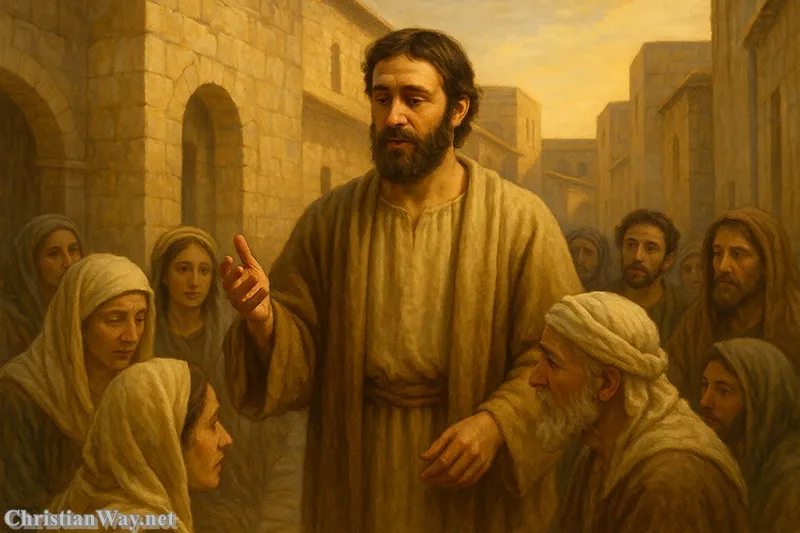Dear friends in Christ,
Every generation of believers stands before the same ancient question: What is the Bible to me? For some, it is a book of history; for others, a moral guide or a source of comforting verses. Yet, for the heart awakened by faith, the Bible is far more than ink and parchment — it is the living Word of God. It breathes, it speaks, and it transforms. It is God’s heart unveiled through human words, inviting each of us into communion with Him.
The Bible is not simply a record of divine encounters — it is a divine encounter. In its pages, we do not merely learn about God; we meet Him. We hear His voice calling our name, urging us toward repentance, mercy, faith, and hope. Through it, God walks beside us, just as He walked with His people in the garden, in the desert, and on the road to Emmaus.
As we open the sacred Scriptures, we step into the eternal story of love between the Creator and His creation — a story that begins with “Let there be light” and finds its fulfillment in the Word made flesh, Jesus Christ. The Bible, then, is not a relic to be studied from afar, but a living relationship that must be received with humility, reverence, and love.
Let us take this journey together — to see how the Bible reveals God’s truth, nourishes our faith, and leads us, page by page, closer to His heart.
The Word That Speaks: God’s Revelation Through Scripture
From the very beginning, God has desired to make Himself known. He spoke the world into being, He spoke to Abraham beneath the stars, to Moses from the burning bush, and to the prophets in whispers and fire. Yet all these voices converge into one great proclamation: “In the beginning was the Word, and the Word was with God, and the Word was God.” (John 1:1)
The Bible is the written echo of that eternal Word. It is the means by which God continues to reveal His mind and heart to the world. As St. Paul tells us, “All Scripture is inspired by God and profitable for teaching, for reproof, for correction, and for training in righteousness.” (2 Timothy 3:16)

This divine inspiration does not erase human authorship. Rather, it elevates it. God chose to speak in human language — through shepherds, kings, fishermen, prophets, and poets — so that His eternal truth could dwell among us. The Bible, therefore, is both profoundly divine and beautifully human.
The Human Voice and the Divine Breath
To read Scripture rightly is to hold this mystery in tension. It is God’s Word, yet it bears the fingerprints of its writers — their fears, hopes, struggles, and joys. This is why the psalms sound like our own hearts praying. It is why the parables of Jesus feel at home in our own lives. The Spirit, who inspired the authors, continues to speak through their words into the human heart today.
When we read the Bible with faith, it becomes more than information — it becomes transformation. The Spirit who once hovered over the waters now hovers over the soul that opens the Scriptures in prayer.
The Unity of the Old and New Testaments
The Bible is a single, seamless story of salvation — one divine narrative written across centuries, yet bound by love.
The Old Testament reveals the longing of God for His people and the longing of His people for God. It tells of promises, covenants, and prophetic hope. Every sacrifice, every psalm, every prophecy points forward to the coming of Christ. As St. Augustine beautifully said, “The New Testament is hidden in the Old, and the Old is unveiled in the New.”
The New Testament fulfills what the Old prepared. The Law becomes grace. The shadow gives way to the substance. The promise takes flesh in Jesus Christ.
When we read both together, we begin to see the breathtaking unity of God’s plan — a love story that stretches from Genesis to Revelation. In the garden, God sought Adam; in the Gospels, He runs to meet the prodigal. At the cross, He opens His heart forever to the world He created.
The Bible and the Church: One Voice of Faith
It is impossible to separate the Bible from the life of the Church. The same Spirit who inspired the Scriptures also guides the community that receives and interprets them. The Church was not built on the Bible alone — rather, the Bible was written within the Church, by believers and for believers, under the breath of the Holy Spirit.
From the first gatherings of the apostles, Scripture was proclaimed in worship, explained in teaching, and lived in charity. The Church, therefore, does not “own” the Bible; she serves it — preserving its truth and proclaiming its meaning to every generation.
Tradition and the Living Word
In the Catholic and Orthodox traditions, Sacred Tradition and Sacred Scripture are two streams flowing from the same divine source. Scripture is the written testimony of God’s Word; Tradition is the living transmission of that Word through the life and worship of the Church. Together, they form one river of revelation.
In the Protestant and Anglican traditions, the centrality of Scripture — the principle of Sola Scriptura (“Scripture alone”) — emphasizes that every believer can approach the Word directly, under the guidance of the Holy Spirit. Yet even there, Scripture remains most powerful when read in communion, not isolation.
What unites all Christians is the belief that the Bible is the Word of God, trustworthy and true, revealing everything necessary for our salvation.
The Word That Forms the Soul
The Bible is not merely to be read; it is to be lived. When its words are allowed to take root, they bear fruit in the life of the believer.
Jesus compared the Word of God to a seed: “The seed is the word of God… the good soil, these are they which in an honest and good heart, having heard the word, keep it, and bring forth fruit with patience.” (Luke 8:11,15)
To read the Bible without conversion is to plant without watering. But to read it prayerfully, humbly, and persistently is to invite God to till the soil of the heart. Slowly, the Word begins to shape our thoughts, heal our wounds, and order our desires toward heaven.
Lectio Divina: A Sacred Way of Reading
One of the oldest ways of entering into Scripture is the practice of Lectio Divina — “divine reading.” This ancient monastic tradition invites us to slow down and listen with the heart. It follows four movements:
- Lectio (Reading) – Reading the passage slowly, allowing the words to rest in your mind.
- Meditatio (Meditation) – Reflecting on what God might be saying personally to you.
- Oratio (Prayer) – Responding to God with love, gratitude, or repentance.
- Contemplatio (Contemplation) – Resting silently in God’s presence, allowing His Word to dwell within you.
Through Lectio Divina, the Bible ceases to be a text we analyze and becomes a relationship we enter — a dialogue of love between God and the soul.
The Bible in Everyday Life
We often think that Scripture belongs only to the church pew or the pulpit. But the Word of God is meant to walk with us through the ordinary hours of our days.
When a mother prays over her child with words from the Psalms, the Bible lives again. When a worker whispers “The Lord is my shepherd” in a moment of fear, the Word becomes light in darkness. When a grieving soul reads, “Blessed are those who mourn, for they shall be comforted,” (Matthew 5:4) the Word becomes flesh once more — offering comfort and presence.
The Bible sanctifies time. It baptizes ordinary life with divine meaning. Every page, every verse, every word is an invitation to live differently — to see with the eyes of faith, to act with the heart of Christ.
The Power of the Word: From Hearing to Doing
In the Epistle of James, we are told: “Be doers of the word, and not hearers only, deceiving yourselves.” (James 1:22)
To truly receive the Bible is to let it transform our actions. The Word challenges our pride, heals our relationships, and moves us toward justice and mercy. It teaches forgiveness in a world of resentment, hope in a world of despair, and love in a world of indifference.
The Word is living and active (Hebrews 4:12) — sharper than any sword because it pierces the soul not to harm, but to heal.
Every saint was once a listener who allowed the Word to take hold of their life. St. Francis heard the Gospel reading, “Take nothing for your journey,” and he obeyed. St. Augustine opened the Scriptures and read, “Put on the Lord Jesus Christ,” and his life was changed forever. The Bible continues to perform this miracle of conversion in every generation.
The Bible as the Story of Love
At its heart, the Bible is a love story — God’s relentless pursuit of humanity. From Eden’s exile to Calvary’s cross, from the empty tomb to the promise of a new heaven and earth, the story remains the same: “I have loved you with an everlasting love.” (Jeremiah 31:3)
Each page tells us that love is not an idea but a person — Jesus Christ, the Word made flesh. When we read Scripture, we are not studying words about Christ; we are encountering Christ Himself. He is the thread that ties together Genesis and Revelation, law and gospel, promise and fulfillment.
The Bible’s power lies not merely in what it tells us, but in whom it reveals. And once we have met Him there, the pages can never close completely — for He continues to write His Word upon the tablet of our hearts.
Reflect and Pray
The Bible is not meant to remain on a shelf or in a pew. It belongs in your hands, on your lips, and in your heart. Read it slowly. Let its light fall gently upon your life. Even one verse, pondered in love, can become a doorway into eternity.
Dear friend, the same God who spoke light into the darkness now desires to speak into your soul. When you open the Bible, you are not alone. The Spirit is there, whispering: “Be still, and know that I am God.”
May your heart become a living page where His Word may dwell richly, and may your life become a testimony of the truth you have received.
“Thy word is a lamp unto my feet, and a light unto my path.” (Psalm 119:105)
May that light guide you always, until the day when faith becomes sight, and the Word Himself welcomes you home.
— Fr. John Matthew, for Christian Way





